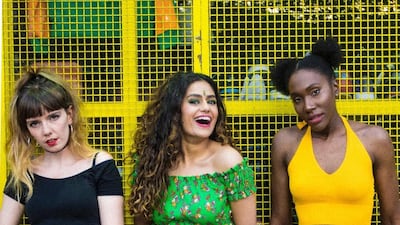British band The Tuts have refused to represent their country in the Eurovision Song Contest this year, as it’s being held in Israel.
The London pop-punk trio told fans on Twitter this week they were asked to enter the international song competition - which will be held in May - as the UK's official performers. “But it’s being held in ISRAEL, so that’s a NO from us,” they added.
The post has since been retweeted nearly 6,000 times and liked by more than 25,000.
As with most comments shared on the social media platform, it garnered a mixed response. The girls later tweeted a picture of themselves performing rude hand gestures in a “message to the trolls”.
Who are The Tuts?
The band is made up of Nadia Javed, Beverley Ishmael and Harriet Doveton. Javed and Ishmael first formed The Tuts in the mid-2000s, when they were teenagers, and bassist Doveton joined in late 2010. The three of them released their debut album, Update Your Brain, in 2016 and in April 2018 featured in the ITV series Young, British and Muslim.
While they're not prominent on the UK's music scene, The Tuts have their own fan following, particularly among feminists.
Singer Pauline Black, from the British ska revival band The Selecter, describes The Tuts as “infectious guitar-led pop wrapped around fiery drums, sharp tongues and splendid harmonies”.
The girls describe themselves on their official website as a band whose live performances “seriously pack a punch and [the girls] are noted for their impassioned songs about sexism, feminism and everyday life-isms.”
Javed, Ishamael and Doveton are no strangers to jumping on-board social awareness bandwagons, either. They've recently become involved in the UK-based #SolidarityNotSilence case, which aims to help "women defend themselves against a defamation claim made by a [currently unnamed] man in the music industry for statements they made concerning his treatment of women".
The response
There were plenty of GIF-led responses to the girls' remarks on Eurovision this week.
Some people were impressed by their bold decision.
Others were more sarcastic.
And while some people tried to say the group’s decision was anti-semitic, others praised the girls for their clear support for Palestine.
Boycotting Eurovision
Palestinian cultural groups have been urging a boycott of this year’s song contest since it was announced it would be held in Israel in 2018. “Would the Eurovision have held the contest in apartheid South Africa?” a statement, signed by the Palestinian Journalists’ Syndicate and network of Palestinian cultural organisations, asks.
It continues: “Israel’s regime of military occupation, settler-colonialism and apartheid is shamelessly using Eurovision as part of its official Brand Israel strategy.
“This contest must be boycotted to avoid complicity and business-as-usual with this regime and to avoid irreversibly tarnishing the Eurovision brand with Israel’s egregious human rights record.”
Similar campaigns and petitions reportedly gained traction in Iceland and Ireland, too.
Following the criticism, the European Broadcasting Union announced the contest will be held in Tel Aviv, as opposed to Jerusalem, as originally planned.
As Israel won the contest last year, thanks to singer and looping artist Netta Barzilai, it also earned the right to host the 2019 event.
The national selection of the UK’s Eurovision Song Contest entry takes place on February 8.


